实验五
实验任务1
#include <stdio.h> #include<stdlib.h> int main() { int x[2][4] = {{1, 9, 8, 4}, {2, 0, 4, 9}}; int i, j; int *p; // 指针变量,存放int类型数据的地址 int(*q)[4]; // 指针变量,指向包含4个int型元素的一维数组 // 使用数组名、下标访问二维数组元素 for (i = 0; i < 2; ++i) { for (j = 0; j < 4; ++j) printf("%d", x[i][j]); printf("\n"); } for (p = &x[0][0], i = 0; p < &x[0][0] + 8; ++p, ++i) { printf("%d", *p); if ((i + 1) % 4 == 0) printf("\n"); } // 使用指针变量q间接访问二维数组元素 for (q = x; q < x + 2; ++q) { for (j = 0; j < 4; ++j) printf("%d", *(*q + j)); printf("\n"); system("pause"); } return 0; }
实验截图
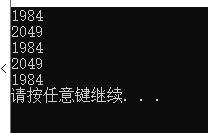
实验任务2.1
#include <stdio.h> #include <string.h> #include<stdlib.h> #define N 80 int main() { char s1[] = "Learning makes me happy"; char s2[] = "Learning makes me sleepy"; char tmp[N]; printf("sizeof(s1) vs. strlen(s1): \n"); printf("sizeof(s1) = %d\n", sizeof(s1)); printf("strlen(s1) = %d\n", strlen(s1)); printf("\nbefore swap: \n"); printf("s1: %s\n", s1); printf("s2: %s\n", s2); printf("\nswapping...\n"); strcpy(tmp, s1); strcpy(s1, s2); strcpy(s2, tmp); printf("\nafter swap: \n"); printf("s1: %s\n", s1); printf("s2: %s\n", s2); system("pause"); return 0; }
实验截图
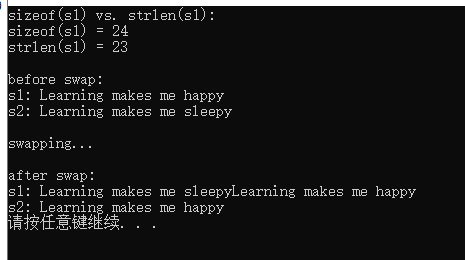
1 s1大小为23,sizeof(s1)为包括结束字符的s1长度24,strlen(s1)为字符长度23.
2 不能替换,char s1[]为非法的sizeof操作数。
3 没交换。
实验任务2.2
#include <stdio.h> #include <string.h> #include<stdlib.h> #define N 80 int main() { char *s1 = "Learning makes me happy"; char *s2 = "Learning makes me sleepy"; char *tmp; printf("sizeof(s1) vs. strlen(s1): \n"); printf("sizeof(s1) = %d\n", sizeof(s1)); printf("strlen(s1) = %d\n", strlen(s1)); printf("\nbefore swap: \n"); printf("s1: %s\n", s1); printf("s2: %s\n", s2); printf("\nswapping...\n"); tmp = s1; s1 = s2; s2 = tmp; printf("\nafter swap: \n"); printf("s1: %s\n", s1); printf("s2: %s\n", s2); system("pause"); return 0; }
实验截图
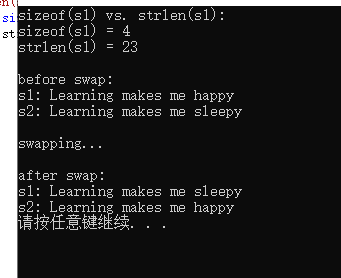
1 存放的是Learning makes me happy,sizeof计算的是字符的数量,其中每一个单词看做一个字符。strlen 计算的是长度。
2 可以 2.2代码中将s1作为一个字符指针,2.1中s1为字符数组。
3 交换的是两个指针的地址,内存没有改变。
实验任务三
#include <stdio.h> #include<stdlib.h> void str_cpy(char *target, const char *source); void str_cat(char *str1, char *str2); int main() { char s1[80], s2[20] = "1984"; str_cpy(s1, s2); puts(s1); str_cat(s1, " Animal Farm"); puts(s1); system("pause"); return 0; } void str_cpy(char *target, const char *source) { while (*target++ = *source++) ; } void str_cat(char *str1, char *str2) { while (*str1) str1++; while (*str1++ = *str2++); }
实验截图

实验任务四
#include <stdio.h> #define N 80 int func(char *); int main() { char str[80]; while (gets(str) != NULL) { if (func(str)) printf("yes\n"); else printf("no\n"); } return 0; } int func(char *str) { char *begin, *end; begin = end = str; while (*end) end++; end--; while (begin < end) { if (*begin != *end) return 0; else { begin++; end--; } } return 1; }
实验截图

实验任务五
#include <stdio.h> #define N 80 void func(char *); int main() { char s[N]; while (scanf("%s", s) != EOF) { func(s); puts(s); } return 0; } void func(char *str) { int i; char *p1, *p2, *p; p1 = str; while (*p1 == '*') p1++; p2 = str; while (*p2) p2++; p2--; while (*p2 == '*') p2--; p = str; i = 0; while (p < p1) { str[i] = *p; p++; i++; } while (p <= p2) { if (*p != '*') { str[i] = *p; i++; } p++; } while (*p != '\0') { str[i] = *p; p++; i++; } str[i] = '\0'; }
实验截图

实验任务六
6.1
#include <stdio.h> #include <string.h> #include<stdlib.h> void sort(char *name[], int n); int main() { char *course[4] = {"C Program", "C++ Object Oriented Program", "Operating System", "Data Structure and Algorithms"}; int i; sort(course, 4); for (i = 0; i < 4; i++) printf("%s\n", course[i]); system("pause"); return 0; } void sort(char *name[], int n) { int i, j; char *tmp; for (i = 0; i < n - 1; ++i) for (j = 0; j < n - 1 - i; ++j) if (strcmp(name[j], name[j + 1]) > 0) { tmp = name[j]; name[j] = name[j + 1]; name[j + 1] = tmp; } }
实验截图
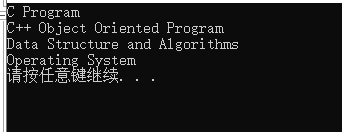
6.2
#include <stdio.h> #include <string.h> #include<stdlib.h> void sort(char *name[], int n); int main() { char *course[4] = {"C Program", "C++ Object Oriented Program", "Operating System", "Data Structure and Algorithms"}; int i; sort(course, 4); for (i = 0; i < 4; i++) printf("%s\n", course[i]); system("pause"); return 0; } void sort(char *name[], int n) { int i, j, k; char *tmp; for (i = 0; i < n - 1; i++) { k = i; for (j = i + 1; j < n; j++) if (strcmp(name[j], name[k]) < 0) k = j; if (k != i) { tmp = name[i]; name[i] = name[k]; name[k] = tmp; } } }
实验截图
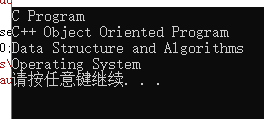
交换的是指针变量的值
实验任务七
#include <stdio.h> #include <string.h> #define N 5 int check_id(char *str); // 函数声明 int main() { char *pid[N] = {"31010120000721656X", "330106199609203301", "53010220051126571", "510104199211197977", "53010220051126133Y"}; int i; for (i = 0; i < N; ++i) if (check_id(pid[i])) // 函数调用 printf("%s\tTrue\n", pid[i]); else printf("%s\tFalse\n", pid[i]); return 0; } // 函数定义 // 功能: 检查指针str指向的身份证号码串形式上是否合法。 // 形式合法,返回1,否则,返回0
int check_id(char *str)
{
if(strlen(str)!=18)
return 0;
else
{
char *p;
p=str;
while(*p>='0'&&*p<='9'&&*p!='\0'||*p=='X')
p++;
if(*p=='\0')
return 1;
else
return 0;
}
}
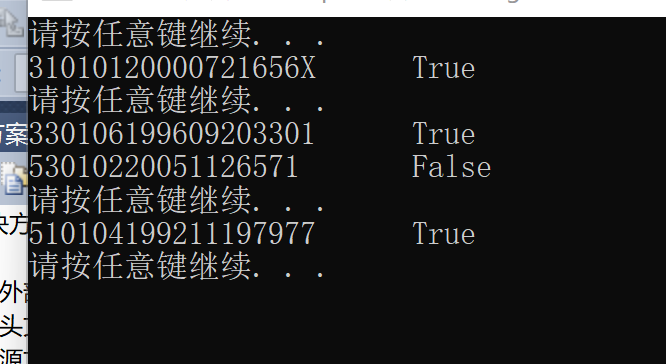
8
#include <stdio.h> #define N 80 void encoder(char* s); // 函数声明 void decoder(char* s); // 函数声明 int main() { char words[N]; printf("输入英文文本: "); while (gets(words) != " ") { printf("编码后的英文文本: "); encoder(words); // 函数调用 printf("%s\n", words); printf("对编码后的英文文本解码: "); decoder(words); // 函数调用 printf("%s\n", words); printf("\n"); } return 0; } /*函数定义 功能:对s指向的字符串进行编码处理 编码规则: 对于a~z或A~Z之间的字母字符,用其后的字符替换; 其中,z用a替换,Z用A替换 其它非字母字符,保持不变 */ void encoder(char* s) { int i; for (i = 0; s[i] != '\0'; i++) { if (s[i] < 'A' || s[i]>'Z' && s[i] < 'a' || s[i]>'z') s[i] = s[i]; else if (s[i] != 'Z' && s[i] != 'z') s[i] = s[i] + 1; else if (s[i] == 'z') s[i] = 'a'; else s[i] = 'A'; } } /*函数定义 功能:对s指向的字符串进行解码处理 解码规则: 对于a~z或A~Z之间的字母字符,用其前面的字符替换; 其中,a用z替换,A用Z替换 其它非字母字符,保持不变 */ void decoder(char* s) { int i; for (i = 0; s[i] != '\0'; i++) { if (s[i] < 'A' || s[i]>'Z' && s[i] < 'a' || s[i]>'z') s[i] = s[i]; else if (s[i] != 'A' && s[i] != 'a') s[i] = s[i] - 1; else if (s[i] == 'A') s[i] = 'Z'; else s[i] = 'z'; } }

posted on 2023-05-10 23:00 202283300646郝遥 阅读(25) 评论(0) 收藏 举报



 浙公网安备 33010602011771号
浙公网安备 33010602011771号